Catch a tripletail on a fly rod: That’s the plan. But as anyone who's spent a year south of I-10 knows: plans conjured from afar are best printed on cork so at least they'd float.
At oh-my-God-it's-early, we bark tires out of south Austin headed east by southeast in a hurry. If we do well and get lucky, we’ll get to the boat slip in time for a couple hours chasing tripletail before night falls. And, I’ll see the sun set on my home of Mississippi as a tourist for the first time.
So we do everything the law will allow — and maybe a little more — to hit the hems of Houston in record time. The Bayou City’s counterattack knocks the wind out of us. But if the gods of fishing and traffic conspire, we hope to get an hour in before dark. And that’s exactly what happens.
With an hour left on the day, we cross the asphalt parking lot toward the slip. Wind-driven sand scours the pavement and hisses over white fiberglass hulls and everything else south facing — a subtle reminder that Mother Nature reigns here. Waters, lands, and human plans all bend to her will. And you’d best not forget it.
Johnny Marquez, director of coastal programs for the Mississippi Wildlife Federation, is standing ready with a strong handshake and an easy smile. In addition to being an impassioned apostle of coastal conservation, he is a tripletail titan and, luckily for me, a helluva nice guy. And, his 1985 Mako’s ready. The gouge from a blue marlin’s bill on the port side tells me both Johnny and his boat are ready for anything.
The Mississippi Sound is a hardwearing chop. Wind’s howling. So, my fly rod stays in the vehicle. No matter. Plans are meant to change and I can see the channel markers guiding us toward the islands when I close my eyes. One step closer to my home waters. I can almost see Pascagoula from here.
Johnny fires it up. The motor sounds from idle gargle to a working glub, glub, glub and slow motion clears some the seductive scent of gasoline on salt air. Against every urge, we no-wake it toward the mouth of the harbor.
“We've had a helluva year,” starts Johnny. “The fishing shouldn't be this good. And it confuses people.”
I’m hooked.
“Excuse me,” yells someone in a timid tone, killing our conversation in its tracks.
Thanks to a gumbo of bad luck, bad influences, bad karma, and bad decisions — a sheepish, grey-haired captain stands off our starboard begging help from the bow of a yacht with a dead motor on the wrong end of the wind. And, our would-be tripletail slayer, waning light, and damn-near depleted patience are the only things that can help him. Hope doesn’t die on the vine, but it’s more raisin than grape. So maybe we comment aloud about his gumbo. More than likely, we mind-cuss his judgment and our luck. And, once we figure out what’s happening, we most certainly take the bowline and get him where he needs to be. It’s what you do. It’s been us before. It’ll be us again.
At 45 minutes until dark, Johnny spins his cap, cranks the radio, hits the throttle, and sends us rodeoing up the chop. Gulf brine crashes over the port gunwales and soaks us from our skivvies to our aspirations. A ten-minute run and we’re at the first piece of jetsam we expect to hold tripletail.
“Read the current and wind,” explains Johnny, “Cast past the target. Then reel right up to it and let it sit. The fish’ll be under it. Don’t get snagged. And, don’t fall in.”
Easy as spey casting a nymph to a teacup from a mudriding pickup while doing your best Michael Flatley impersonation.
Against all odds, my fishing buddy puts it where it needs to go. What looks like lips on a piece of plywood emerge at the surface. Line tightens. We hoot and holler — against the stylings of our preferred self-images. The rod doubles. We hold our breath and go silent as a good meal. Slack line. Gone.
The wind makes it too hard to think. So Johnny cranks up the radio and we gallop across the Mississippi Sound. By the time it’s too dark to do anything but lose gear, we’ve landed two tripletails. So, Johnny drops the hammer and cranks the radio. Today was good. Tomorrow should be even better.

“As the son of a son of a sailor I went out on the sea for adventure,” sings local son Jimmy Buffet as we buck and slam across wave tops. Water crashes over the bow.
Coastal lights beacon and I consider the buildings and the people that have survived Hurricane Camille and subsequent storms, the buildings that have cropped up since Katrina, those the sea will harvest in the next, and the ancient oaks who’ve stood sentinel to everything since Hernando De Soto came a courtin’.
We step into a young restaurant in an old building. I hope it’ll endure whatever’s next. A fried-oyster poboy and a Chandeleur Island micro-brew served with a sweet Southern accent. Good to be home — even as a tourist. But my inner tourist is doomed without my knowing. He’s celebrating strong while we recount the missed plywood with lips, the knuckle-busters we landed, and the limit we’re sure to catch tomorrow.
Tourist me withers as the conversation shifts to the perennial challenges on the Gulf Coast: People and the environment, competing needs, contradictory solutions, and one reality: whatever we do, Mother Nature has the upper hand, no matter who’s trying to put a glove on it. The tourist livens to hear about some of the good things happening in the recovery after Hurricane Katrina and with the $16 billion funding the recovery from the BP oil spill.
But when Johnny explains that the latest iteration of man vs. nature colludes with man vs. self, the tourist dies, dries up, and blows away on the Gulf breeze. This kind of issue is why Johnny left D.C. and came home to be part of the solution.
“Like I was saying, the fishing shouldn’t be as good as it is this year,” explains Johnny.
Our good fortune is not a favor from fishermen’s patron St. Peter or a benediction born in the Blessing of the Fleet. Our luck is a temporary intoxication distracting us from the chronic maladies in the human relationship with the Mississippi River.
For context, 41 percent of the landmass of America’s Lower 48 drains into the Mississippi River and, when things go as planned, the water flows without incident past the Port of New Orleans and out of the mouth of the river into the Gulf. No problem. Over time, engineers and heavy equipment have transformed the river and adjacent landscapes such that it is now less a system for natural function (e.g. replenishing wetlands and supporting wildlife nurseries) and more a channel for transportation and commerce. Count among the changes the creation and maintenance of Bonnet Carré spillway and other structures that maintain this transportation system and protect New Orleans, Saint Bernard Parish, and Plaquemines Parish from floods by diverting water through Lake Pontchartrain and into Lake Borne at the mouth of the Pearl River where the waters and the interests of Louisiana and Mississippi meet, compete, mingle, and blur. Since 1937, the Bonnet Carré spillway has been opened 14 times. Sounds okay. But, we’re seeing a trend of more frequent, and longer openings. In the last 10 years, the spillway has been opened five times. Twice in 2019.
In 2019, floods along the Mississippi River caused more than $12.5 billion in damage to crops and property along the river. Those floods led to the two openings of the spillway and, thereby, nature and humans collaborated to send 200 trillion gallons of fresh water rushing into the Gulf of Mexico — 80 trillion gallons above normal. A disaster for natural systems and human settlements alike.
“People shouldn’t get confused though, fresh water is not the enemy,” says Johnny. “We just can’t handle it all at once.”
Freshwater inflows, he explains, are an important part of a natural process that create and maintain a healthy Gulf, healthy habitat, healthy wildlife and a healthy economy. But, this only happens when inflows are gradual — or perhaps more appropriately put, natural. Johnny says the 2019 floods demonstrate the impacts of freshwater inundations. Algal blooms forced the closure of Mississippi beaches during peak tourist season, costing the coastal economy millions. Oysters died in Louisiana and Mississippi and along with them much of the fishing industries and coastal economy. Mississippi’s shrimping season has been abysmal. Mississippi’s crab harvest is down 35-40 percent. But the fish can move, he says, so they did. And, to our benefit and other’s dismay, the water pushed fish from Louisiana into Mississippi waters. So the fishing here got really good.
Texas conservationist Dr. Andrew Sansom of The Meadows Center for Water & The Environment says, “when it comes to water, there are winners and there are losers” The 2019 floods offer a case in point.
This year, maybe we and the rest of the Mississippi coastal recreational fishermen won a little something — a few extra tight lines and tripletail tacos. But, to only celebrate that win is to ignore the greater losses. And, to only celebrate those fish fights is to ignore yet another challenge with life along the length of the coast. We’ve grown accustomed to preparing for and responding to storms and other disastrous events. It’s part of life. And, we wear the badge proudly. But, slow burn disasters whisper. And, we can do a much better job of understanding and fixing this quiet calamity that is destroying habitat, crippling fisheries, hamstringing economies, and eroding livelihoods and traditions.
The 2019 floods are neither the first nor the last — just the latest. And the problem isn’t even unforeseen.
"One who knows the Mississippi will promptly aver, not aloud but to himself, that ten thousand River Commissions, with all the mines of the world at their back, cannot tame that lawless stream, cannot curb it or confine it, cannot say to it, Go here, or Go there, and make it obey; cannot save a shore that it has sentenced; cannot bar its path with an obstruction which it cannot tear down, dance over, and laugh at,” Mark Twain, Life on the Mississippi, 1883. And when Twain wrote this, he wasn’t pulling a Nostradamus. He had 159 years of evidence at his back, according to John McPhee, since the first decree to build levees (big dirt mounds) near the city of New Orleans rolled out.

For better or worse, still today the Mississippi River and humanity's manipulations thereof join hurricanes and the rest of Mother Nature’s manifestations to shape and reshape life on the Gulf Coast. And, shit’s complicated. Livelihoods, tradition, economy, nature and natural resources, community, conservation, local self preservation and what may as well be foreign policy for the D.C. set are tangled like so many loops in a baitcaster’s backlash, what is known in the local parlance as a “wasp nest”.
From Mississippi to South Texas and elsewhere along the Gulf coast, water – literally and figuratively — surrounds us. Rivers, bays, creeks, backwaters, marshes, sloughs, and the Gulf turn communities into de facto islands. Meanwhile, a traditional family can have members earning a living on the offshore rigs, fishing commercially, running charter boats, building ships, diving commercially, working at a waterfront refinery, or if they’ve traded craft for the service economy — working at the floating casinos. In their free time they may fish, hunt, run boats up the rivers or raise hell on the islands. And, often, a portion of their time and income goes to Coastal Conservation Association, National Wildlife Federation’s Vanishing Paradise, or other such causes.
Meanwhile, there’s the knowledge that soon will come the next hurricane, flood, oil spill, or other disaster. It’s all part of life on the coast. And, as in such communities around the world, residents live in and rely on the natural resources to extreme degrees. And, in that monofilament wasp nest, pull one loop and choke something out. Cut anything and it all falls apart. Fuck with any of it, and start a fight to the death. Even when that’s not true, it feels that way. And, time and tide have taught coastal folks to earn when you can, save for a rainy day, and that nothing is as simple as it seems from north of I-10.
Another round. We won’t untangle the knot tonight. But, we’ll fish tomorrow.
At 0700 we stand at the dock in a southerly howling at us like a heartbroke hound. We go anyway. The motor hums as we climb the face and roars guttural in the air as we jump the crest. The bow slams into the next face. And we bow to the queen. A hundred yards outside the harbor and even our backs are wet. But there are fish to catch.
Johnny's phone rings. “I just saw a Mako headed out in this mess. That you?,” asks a fellow waterman. Paying attention. Checking in. Ready to help how he can.
We battle waves and win fish fights until we get one of those limits. The winds drive down our prospects for productivity and safety so we head back to cover. We get dry. Metal bangs masts. Flags pop rapid fire. And, we study the horizon for hope of calm seas.
Instead we learn a storm will flood Houston early in the morning. We have no desire to be rescued from I-10 by the Cajun Navy. So, our plans bend: We’ll fish today and drive all night.
Catch a tripletail on a fly rod: That was the plan. But as anyone who's spent a day south of I-10 knows: plans conjured from afar are best printed on cork.
To learn more about the Mississippi River and what’s happening with freshwater inflows, wetlands, and habitat check out: VanishingParadise.org, Rising Tide by John M. Barry, and What we’ve done to the Mississippi River: An explainer by Alexis Madrigal. If you want to become part of the solution, reach out to Johnny Marquez, director of coastal programs at Mississippi Wildlife Federation.




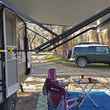
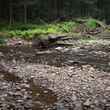
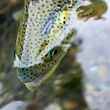
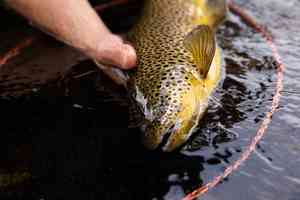

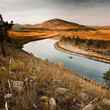
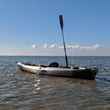
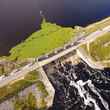
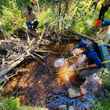
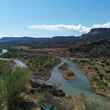
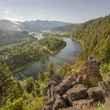




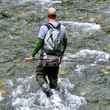



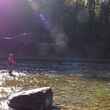
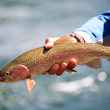
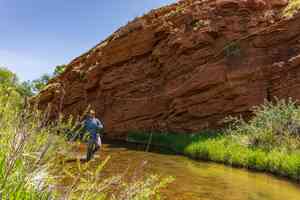

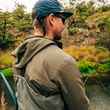
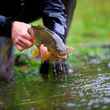

Comments
Reed Guice replied on Permalink
Great article on the status and future of the Mississippi Gulf Coast. Writer is an excellent journalist and really got down to the meat of the matter concerning Mississippi water intrusion from the opening of the Bonnet Carre spillway.
Those tripletail really get under your skin, don't they.
-- A lifelong native and avid fly fisherman.
shannon replied on Permalink
Very good article, and a long one at that!
Pages